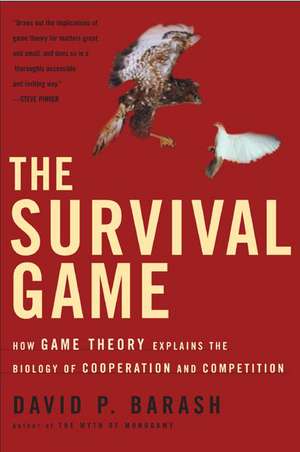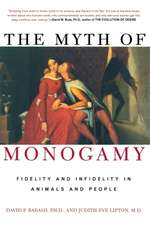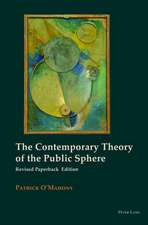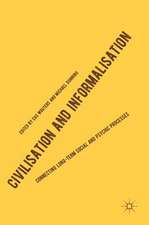The Survival Game: How Game Theory Explains the Biology of Cooperation and Competition
Autor David P. Barashen Limba Engleză Paperback – 31 aug 2000
"An accessible, intriguing explanation of game theory . . . that can help explain much human behavior." -Seattle Post-Intelligencer
Humans, like bacteria, woodchucks, chimpanzees, and other animals, compete or cooperate in order to get food, shelter, territory, and other resources to survive. But how do they decide whether to muscle out or team up with the competition?
In The Survival Game, David P. Barash synthesizes the newest ideas from psychology, economics, and biology to explore and explain the roots of human strategy. Drawing on game theory-the study of how individuals make decisions-he explores the give-and-take of spouses in determining an evening's plans, the behavior of investors in a market bubble, and the maneuvers of generals on a battlefield alongside the mating and fighting strategies of "less rational" animals. Ultimately, Barash's lively and clear examples shed light on what makes our decisions human, and what we can glean from game theory and the natural world as we negotiate and compete every day.
Humans, like bacteria, woodchucks, chimpanzees, and other animals, compete or cooperate in order to get food, shelter, territory, and other resources to survive. But how do they decide whether to muscle out or team up with the competition?
In The Survival Game, David P. Barash synthesizes the newest ideas from psychology, economics, and biology to explore and explain the roots of human strategy. Drawing on game theory-the study of how individuals make decisions-he explores the give-and-take of spouses in determining an evening's plans, the behavior of investors in a market bubble, and the maneuvers of generals on a battlefield alongside the mating and fighting strategies of "less rational" animals. Ultimately, Barash's lively and clear examples shed light on what makes our decisions human, and what we can glean from game theory and the natural world as we negotiate and compete every day.
Preț: 130.35 lei
Nou
Puncte Express: 196
Preț estimativ în valută:
24.95€ • 27.09$ • 20.95£
24.95€ • 27.09$ • 20.95£
Carte disponibilă
Livrare economică 02-16 aprilie
Preluare comenzi: 021 569.72.76
Specificații
ISBN-13: 9780805076998
ISBN-10: 0805076999
Pagini: 302
Dimensiuni: 140 x 211 x 23 mm
Greutate: 0.36 kg
Ediția:Reprint
Editura: Owl Books (NY)
ISBN-10: 0805076999
Pagini: 302
Dimensiuni: 140 x 211 x 23 mm
Greutate: 0.36 kg
Ediția:Reprint
Editura: Owl Books (NY)
Notă biografică
A professor of psychology at the University of Washington in Seattle, zoologist David P. Barash is the author of more than a dozen books, including The Myth of Monogamy (0-8050-7136-9) and The Mammal in the Mirror. He lives in Redmond, Washington.
Recenzii
"Barash combines game theory with evolutionary biology, arguing that the strategic choices people make as they go through life [are] encoded in their brains by millions of years of evolution . . . His examples-including farm economics, jungle mating strategies and World War II battlefields-are convincing."-"The Washington Post"




























